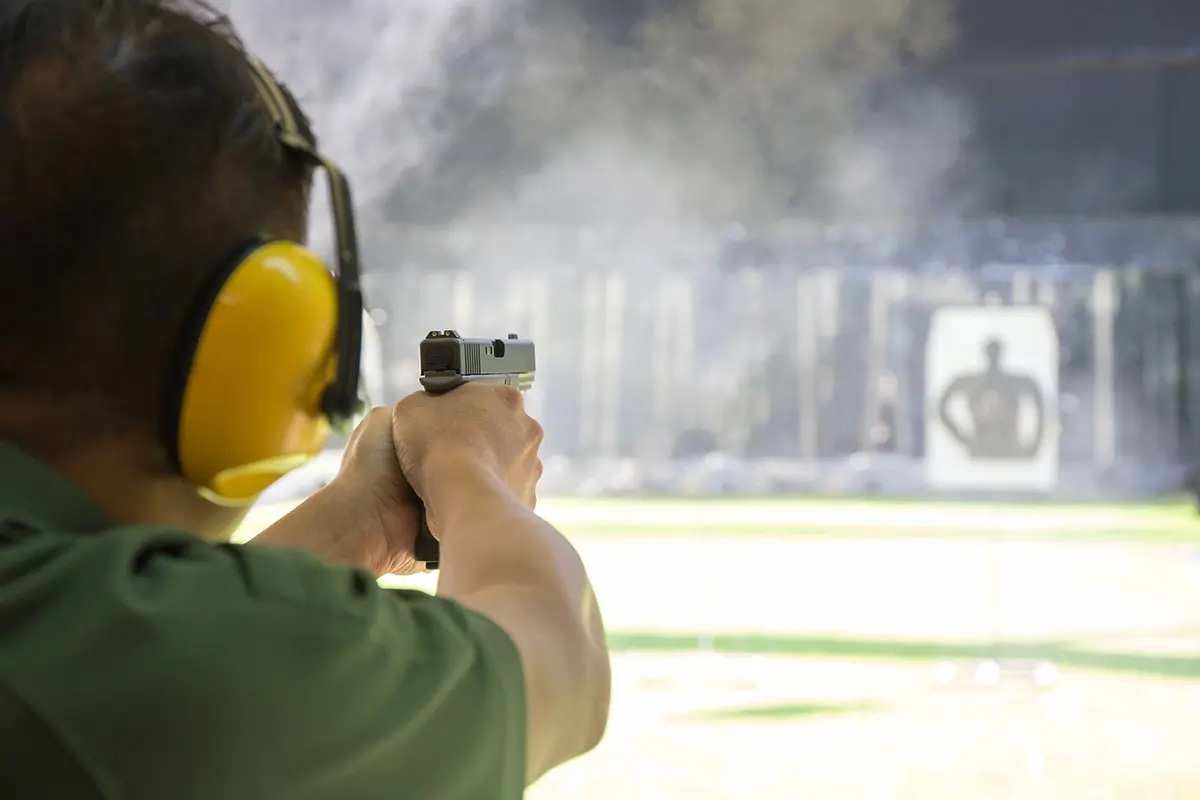
If you own a gun, it is imperative you learn these three legal concepts that will help you know when it is reasonable to use deadly force. Most gun owners nationwide will recognize these three doctrines, even though they may have different names in each state. Today, we are focusing on: 1) the Legal Duty to Retreat; 2) Stand Your Ground (No legal duty to retreat); and 3) the Castle Doctrine. A better understanding of these concepts can help keep you on the right side of the law.
The Legal Duty to Retreat
It was once the prevailing doctrine that a person could be disqualified from using deadly force in self-defense if it was shown that he or she had an opportunity to safely retreat from the situation and did not. What is the legal duty to retreat? In layman’s terms, it means if you are attacked, but you know you have the ability and opportunity to escape safely, you must attempt to do so instead of using force (or deadly force) against your attacker. This philosophy is based on the idea that a human life, including that of a criminal, should only be taken as a last resort.
Fourteen states continue to impose some form of a legal duty to retreat: Arkansas, Connecticut, Delaware, Hawaii, Maine, Maryland, Massachusetts, Minnesota, Nebraska, New Jersey, New York, North Dakota, Rhode Island, and Wisconsin. It is important to note that most states impose a legal duty to retreat only if it can be shown that the defender knew or should have known there was a reasonably safe way to retreat. If there is no safe way to retreat from an attack, then these states allow you to defend yourself. Additionally, most of these states do not require you to flee from the inside of your own home. It is easy for a prosecutor to coolly and calmly reflect on possible escapes to argue that the person was not justified in using deadly force in self-defense. However, in the heat of the moment, while being attacked, when fear and adrenaline are pumping through the body, the imposition of a legal duty to retreat can be a harsh precondition. This is why most states have reconsidered the unfair burden on the victim and abandoned the legal duty to retreat in favor of its converse: no duty to retreat.
Stand Your Ground (No Legal Duty to Retreat)
In the last 20 years, most states have revised their statutory self-defense laws to affirmatively state that there is no legal duty to retreat. This doctrine is commonly referred to as Stand Your Ground. “Stand Your Ground” means if you are anywhere you have a legal right to be and you are attacked in a way that would justify the use of force or deadly force, you are not legally required to consider your ability to retreat before defending yourself. For example, if you are approached when leaving the grocery store by someone threatening you with a knife, the fact that you did not flee by retreating to the store or running for your car before defending yourself cannot be used against you. You may stay where you are legally allowed to be (ergo, stand your ground) and use deadly force to defend yourself.
Typically, most Stand Your Ground jurisdictions require meeting a few factors before using force or deadly force in self-defense. These factors generally include: you must have a legal right to be in the place you are located when the force (or deadly force) is used; your use of force (or deadly force) is legally justified; you did not provoke the confrontation; and you were not engaged in criminal activity at the time you were acting in self-defense. Again, these are not nationally uniform concepts, but are the factors we see most frequently in Stand Your Ground states.
By way of illustration, if a random person comes onto your property in a Stand Your Ground jurisdiction, you tell them to leave immediately, and they refuse, they are now trespassing. You physically attempt to gently usher the trespasser away, and they punch you in response; the trespasser could not claim they punched you because they “stood their ground” since they did not have a lawful right to be on your property. However, you would likely be successful in arguing that you stood your ground when you responded to their unlawful use of force with defensive force.
The Castle Doctrine
Typically, the duty to retreat does not apply in your own home because of a legal philosophy commonly referred to as the Castle Doctrine. Under the Castle Doctrine, a person, as the “King” or “Queen” of their own home, is never required to flee their castle before using force or deadly force against an unlawful intruder. All 50 states have some variation of the Castle Doctrine on their books, although a specific state’s laws may not actually contain the words “Castle Doctrine.” The importance of the Castle Doctrine lies in its creation of a legal presumption. Generally, the Castle Doctrine’s legal presumption has the effect of establishing the reasonableness of a person’s belief that force and/or deadly force was necessary to prevent substantial bodily harm, death, or a forceful felony. Unless rebutted, a jury would be obligated to find them not guilty if charged and tried for assault or murder. In a self-defense case, it is of the utmost importance to establish the Castle Doctrine. Similar to “Stand Your Ground,” the specific factors and wording of this law vary from state to state.
How Will You Be Judged?
Contrary to what their critics say, the Castle Doctrine and Stand Your Ground laws are not licenses to kill. While each state’s self-defense law is different, we see common elements. That is, force, including deadly force, can only be used in the face of an imminent attack and that any force used to defend yourself be immediately necessary and not disproportionate to the attacker’s use of unlawful force.
If you are compelled to use force or deadly force and seek to be justified under the Castle Doctrine and/or Stand Your Ground, by what standard will you be judged? The law will evaluate your use of force (or deadly force) using what is called the “reasonable person” standard. That is, would a reasonable person under similar circumstances agree that the use of force or deadly force was immediately necessary? The reasonable person standard is the law’s attempt to make the concept of reasonableness an objective test. The jury will decide whether a reasonable person in the same circumstances would have used force and how much force was necessary in defending themselves or someone else. The Castle Doctrine will give you a legal presumption of reasonableness, and Stand Your Ground will prevent the prosecutors from arguing that your use of force or deadly force was unnecessary because you had an opportunity to retreat.
Since the justification for using force must be seen from the defender’s perspective, you must be prepared to articulate why you used the level of force you did and why that level of force was reasonable under the circumstances. However, trying to communicate those details to an officer immediately after a self-defense incident can be extremely difficult, which is why we offer our AttorneyResponse 365™ emergency hotline to our members. You should always confer with an attorney before speaking to the police.
For any questions regarding your state’s legal duty to retreat, Stand Your Ground, or Castle Doctrine laws, call U.S. LawShield and ask to speak to your Independent Program Attorney.
The information provided in this publication is intended to provide general information to individuals and is not legal advice. The information included in this publication may not be quoted or referred to in any other publication without the prior written consent of U.S. LawShield, to be given or withheld at our discretion. The information is not a substitute for, and does not replace the advice or representation of a licensed attorney. We strive to ensure the information included in this publication is accurate and current, however, no claim is made to the accuracy of the information and we are not responsible for any consequences that may result from the use of information in this publication. The use of this publication does not create an attorney-client relationship between U.S. LawShield, any independent program attorney, and any individual.





Hi I had an incident recently, that might better help people, understand why it’s not always in your best interest to retreat. I was taking my 90 year old father for physical therapy, and went to open the gate, at the end of the driveway, as I did, a large man armed with brush ax approached me, muttering to himself, and very agitated, as luck would have it, a truck passed by at the same time, and the guy took off chasing the truck down the street, screaming, how he was going to cut the guys head off. The driver hearing this did what he should, and just kept going. The odd part was this guy chased this truck down the street for two hundred yards like an Olympic sprinter. Had my decision been to run, it would have cost me my life. I’m a defensive tactics instructor, so we retried this scenario multiple times in the dojo, and the result was always the same, the attacker will catch you, if close enough, when he begins his attack, and trying to shoot, behind you while running, is very difficult to do, if you do hit him, it’s by luck, and then will it stop him? Now I don’t know if this guy was off his meds, or on something, but you really have to be honest with your self, can you realistically out run your attacker, if not than it is better to meet him head-on, you stand a better chance of surviving. One other note as a defensive tactics instructor, if you want to stop a person with non firearm, taking out his pelvis/hips will take away his mobility, it’s also a big target, and he can’t chase you, besides this guy in all likelihood could have taken multiple shots to the chest, and still kept coming, while they may be lethal, would they have taken effect, before he cut me in two? We’ll never know, but!
I never heard this tactic before and it really has me thinking. While trying to hit his hip in the heat of the moment what if I Inadvertently hit the abdomen and I,m quite accurate. That is definitely not a show stopper. I’m not disputing your tactic I’m just not sure if everyone could pull it off effectively.
Being a Vietnam Combat Veteran and I can tell you that you will Never know what your going to do when you are confronted by a person(s) that is intent on doing you bodily harm until it happens the first time, hopefully, “Your” Training and muscle memory reflexes will take over and you will respond as Trained & Justifiably.
My “Bottom Line” is TRAINING & PRACTICE (lots of practice) and hope that it never happens to you, taking a man or woman’s life is a Permanent Life Changing event that you will remember the rest of your Life. Be Safe and Always be observant to things going on around you (not just in front (tunnel vision)). Be Safe, Be Ready.
Thank you Sir for your service. Very valuable information for sure.
Vic…..you are correct, Vic you know being a Vietnam Vet, not being able to see your attacker that you are always on guard and ready. Vic, I know you been here with much respect to all our Vets including our Vietnam vets that fought for us, and never backed down !!!. Only those that know the tunnel effect to focus on the one person and sometimes blind to the peripheral vision would know this. I have been in Dojo training, and have been asked when I was a only a white belt if I have done this before when they would put two-three against me. We are talking late 80s and early 90s before the sensitive parents and lawsuits.
I responded that I have some experience without telling them when or how…… called street experience, called real life, and those that train in a Dojo for 3-7 yrs, not all but many cannot apply what they have learned never having to defend themselves. When it happens the techniques from hand to hand or weapons is no longer for show and graded for next belt. In the street there is no bell, no one to stop, and anything goes. Once you drop blood with no mouth piece or head gear, you learn real quick what to do and how to defend to minimize lose of blood next time….this is not taught in Dojo. Here is very experienced tip when approached by more than one, you need to attack first and simultaneously in rotation attack #1, #3, #2, #1, #3, #2….you get the point. If you can walk away, then walk away because you will experience cuts or broken bone. If you are unable to get away then you need to attack first which is not expected from those that want to cause you harm, if not, you will be rushed at the same time, and when the distance is closed, it becomes harder to move around and attack, you do not want them to be able to grab you. You want to take of your shirt or sweater before, not to show you are tough, but to eliminate the possibility of being grabbed by your shirt and the other party getting control…..they will try to grab you, and if you have a sweater or windbreaker that does not tear you will be a great disadvantage.
I agree trying to run from a situation does work and sometimes does not, at the end of running you have just exhausted your body, you have to stop and will become weaker to defend. If more than one attacker, you will have a big problem if they catch you. If you run, and they stop that is great. If they do not stop, then you need to find or make a weapon as you are running and running, that means if all there is is breaking off tree branch then you better do it soon or maybe a bottle on ground or maybe busting out a wood fence piece, the point is you need to make the odds even or in your favor.
Like I said, unless you have been in a real world situation, then all you have been trained may go out the door. I had my son being a professional MMA fighter even making to Belatore tell me, “dad I can take you now.” I responded that there is no ding ding bell or referee in street fight, there are no rules, anything goes to the end. Not sure why he stated this, he and I are best friends and I support all he does. This was about six years ago. He only stated this once. Yes, he is 33yrs old now, and he knows my past only to show and teach him a better direction, which he made as Super of Construction company, and now in the police academy.
So, hopefully no one has to be in this situation, there is a reason I moved out where I grew up and not by choice I grew up here, having to fight just walking to school or back home. My kids do not need this or this type of environment and why I did not raise them in this type of environment. I do not forget, but I do not visit this area ever, the best way to avoid these type of situations is not be around these type of environments where things like this happen all the time.